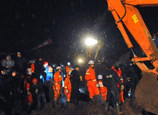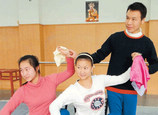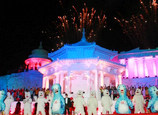
 |
| Mou teaches Wu Yaoyao the water-sleeve movement. (Shanghai Daily) |
Mou estimates that only around five of his 70 students today will be capable of major roles. Most come from small towns and rural areas. He expects many to quit and seek better pay and prospects.
Because people have so many entertainment options, Peking Opera and other traditional theater need to adapt plays and create new ones to appeal to younger audiences, he says.
"The Fall of Green Beads" was the first attempt of Mou and his teacher Bi. They condensed the four and a half hour play into two hours, simplified the plot, emphasized the conflict and drama and used simple but evocative stage settings and props.
Critic Chen Daming from the Shanghai Dramatists Association says lack of good scripts about ancient ladies is a challenge for nandan performers. "Nandan players do have advantages in performing classics because of their energy, louder voice, stronger physique and better martial arts skills," he says.
But most modern plays and adaptations emphasize a more natural and true-to-life performance style, he observes, "so men don't have an advantage compared with female singers in depicting women.
"Some people today may feel uncomfortable to see men playing women."
Today, the nandan tradition flourishes Japan's highly stylized kabuki theater. In Kunqu and some traditional Chinese operas, comic female roles such as matchmaker and procurer are also played by men.
But Chinese experts say the nandan tradition will rarely be accepted by mainstream audiences though it will still have aesthetic and academic value.
Though some people are sceptical about nandan performers' masculinity, Mou says there's no gender confusion for him.
"Portraying women on stage is a job. In my leisure time, I am no different from my post-80s peers. I like watching films, going to parties and being with friends."

















 Beijing police save female hostage
Beijing police save female hostage


![]()
